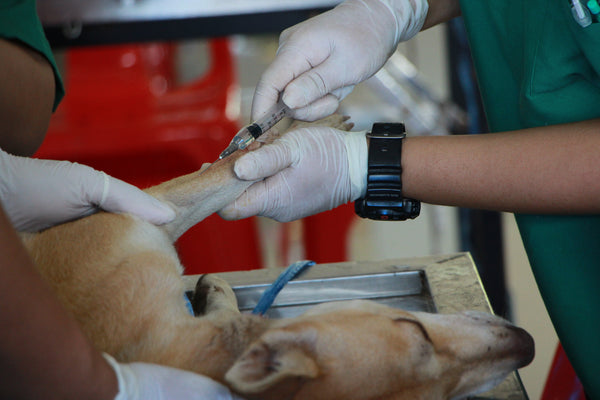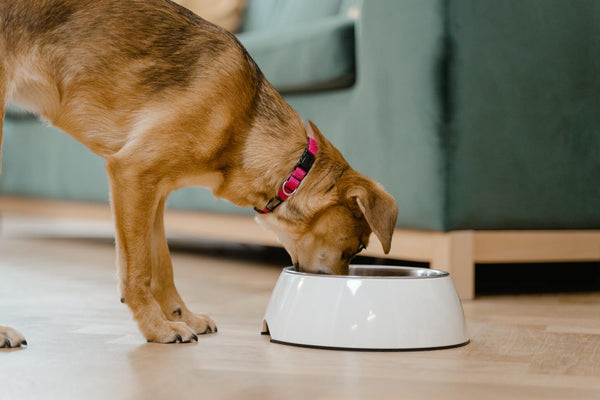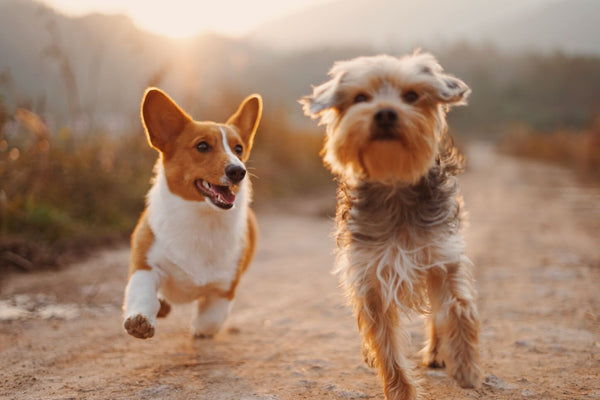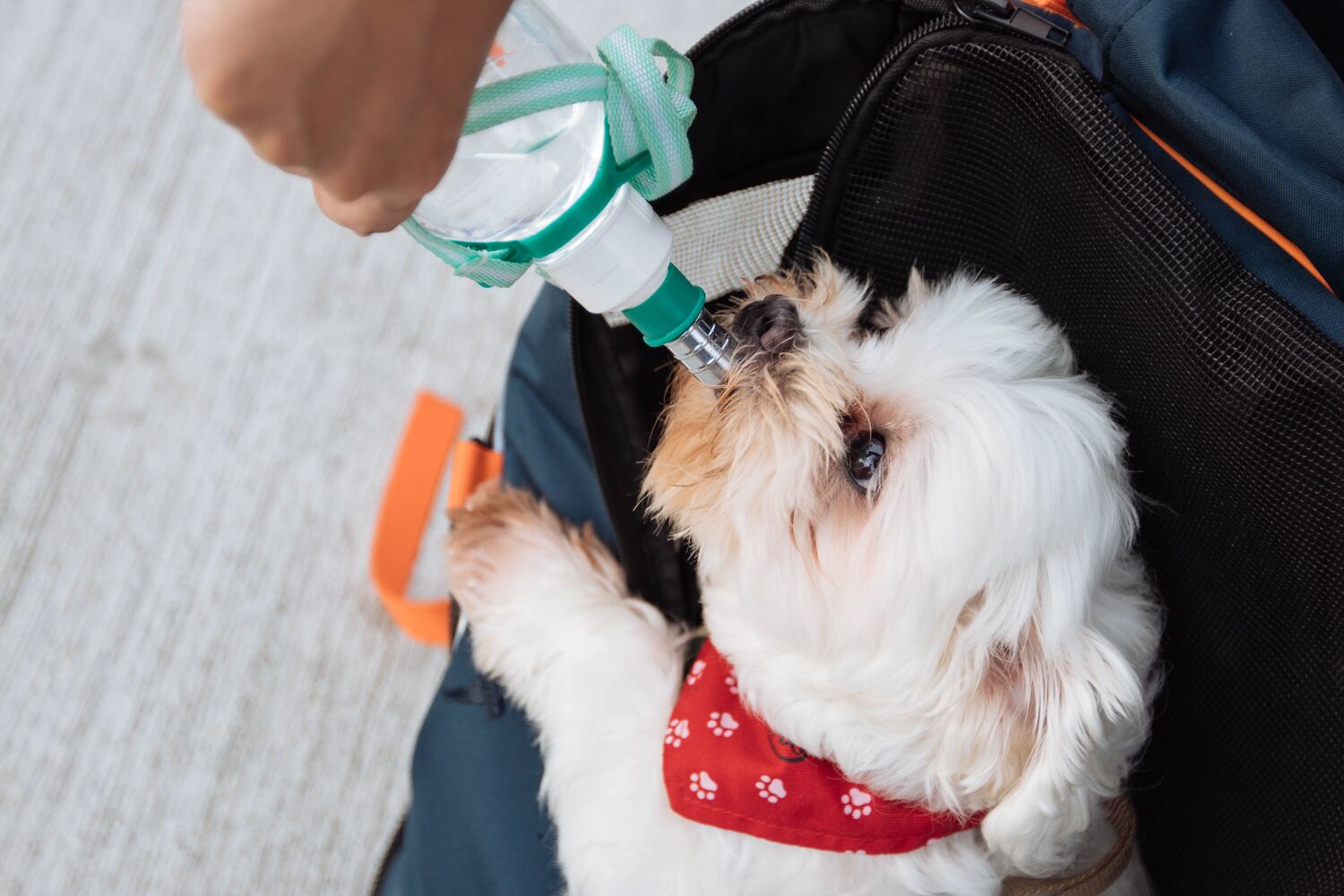Dogs are just like us and can become dehydrated if they don't get enough fluids. This condition is especially common in hot summer months and during strenuous activities such as running or playing at the dog park.
Dehydration can cause various health problems and can even be life-threatening in extreme cases.
But the good news is that it's easy to recognize and prevent dehydration in dogs. Proper dog hydration is incredibly important, so we'll provide 10 proven ways to keep your dog hydrated in this article!
How can I tell if my dog is dehydrated?
Here are some things to look out for:
- Your pup is panting heavily or drooling more than normal.
- Their skin looks dry and doesn't bounce back quickly when gently pinched (called the "skin tent test").
- They're lethargic and may not be interested in their usual activities.
- Their eyes appear sunken.
- Their body weight has decreased
- They may vomit or have diarrhea more frequently than normal.
- They are not producing as much urine as usual.
If you observe any of these signs, take your pup to the vet right away for a diagnosis and treatment plan!
What happens if I don't treat dehydration in my dog?
Dehydration can cause serious health problems in a dog's body, including organ failure and an increased risk of heat stroke. If left untreated, it can even be fatal. So it's crucial to take action and go to the vet immediately as soon as you notice any of the signs listed above.
What causes dehydration in dogs?
The most common cause of dehydration in dogs is not drinking enough water. This can happen if your pup isn't feeling well, has an illness or injury, or is on certain medications that make him thirsty (such as antibiotics).
Additionally, dogs can become dehydrated in hot weather due to excessive panting and sweating, which is their way of regulating body temperature. It's important to ensure that your furry friend always has access to fresh water and monitor their hydration levels, especially during warmer months or when they are unwell. Regular water intake is crucial for maintaining their overall health and well-being.
9 Proven Ways to Rehydrate a Dog
1. Give Your Dog Fresh Water
The most obvious and effective way to help rehydrate your beloved canine companion is by providing them with an ample supply of fresh and clean drinking water. It is highly recommended to ensure that water bowls are filled with refreshing water and are always within their reach, allowing them to quench their thirst whenever needed.
Additionally, it is advised to regularly check your dog's water bowl and replace their water bowl, especially if you are using an old one, to maintain proper hygiene and cleanliness for your furry friend. If you are gone for long periods, try investing in drinking fountains that run fresh water continuously (instead of just having standing water).
2. Try Adding Flavor to Their Water
If your pup isn't a fan of plain water, you can add some flavor to make it more enticing. Consider adding a splash of low-sodium beef or chicken broth to their water bowl. The aroma and taste will surely capture their attention and encourage them to drink more.
Another option is to infuse some freshness by adding a squeeze of lemon juice or a few slices of fresh fruit to their water bowls. This will not only add a delightful hint of flavor but also provide some additional nutrients. Experiment with different combinations to find what your furry friend enjoys the most!
3. Increase the Amount of Wet Food
Adding more wet food to your pup's regular diet is an easy and effective way to help rehydrate them. Wet food not only provides essential moisture but also helps replenish lost fluids, keeping your furry friend hydrated and healthy.
It is crucial, however, to ensure that you are feeding your pup high-quality wet canned food that is specifically formulated to meet their nutritional needs based on their age and breed. By incorporating this simple yet essential step into your pup's feeding routine, you can ensure optimal hydration and overall well-being for your beloved companion.
4. Add a Broth To Their Food
Adding some flavorful and nutrient-rich broth to your dog's food can be a beneficial way to help them stay hydrated and ensure optimal health. The liquid in the broth will not only provide essential hydration but also get readily absorbed into the body, aiding in digestion and promoting overall well-being.
When choosing a broth, opt for a low-sodium variety to maintain a balanced diet for your furry friend.
5. Give Your Dog Frozen Treats
Frozen treats such as ice cubes or frozen watermelon can help to cool your pup down on hot days and also provide some much-needed fluids. These treats are particularly beneficial if your pup doesn't like drinking water. The tasty and refreshing treats will help entice them to consume more fluids.
Just make sure to offer only small pieces at a time, as large amounts of watermelon can cause digestive issues.
6. Offer Vegetables
Vegetables like cucumbers and celery are not only delicious but also packed with moisture, making them a great choice to help rehydrate your pup on a hot day. The high water content in these veggies can provide a refreshing boost, keeping your furry friend hydrated and cool.
Additionally, carrots and zucchini sticks can be a crunchy and satisfying treat that adds a nutritious twist to their snack time. So next time you're looking for a healthy and hydrating option for your pup, consider these vegetable delights
7. Make Homemade Rehydrating Treats
Making some homemade rehydrating treats for your pup is not only a fun activity but also a great way to encourage them to drink more water. You can choose a variety of ingredients that are safe for dogs, such as fruits or vegetables that have high water content, and mix them with some plain or low-sodium broth to create a flavorful concoction.
Once the mixture is ready, you can freeze it into cubes or use fun-shaped moulds to make it more appealing to your furry friend. Not only will these treats help keep your pup hydrated, but they will also provide them with a tasty and refreshing snack.
8. Make sure he's not drinking from puddles, toilets, or other sources that could be contaminated.
It is crucial to ensure that your furry friend doesn't drink water from puddles, toilets, or other potentially contaminated sources of water. Drinking from such sources can not only lead to illness but also fail to effectively rehydrate them.
To keep your pup healthy and hydrated, always provide a fresh and clean bowl of drinking water. Additionally, it's advisable to keep a watchful eye on them when they are outside, ensuring they do not consume any unsuitable water sources.
9. Visit the Vet
If you suspect that your furry friend is severely dehydrated, it's crucial to seek immediate medical advice. Dehydration can pose serious risks to a pup's health, so it's essential to consult a veterinarian as soon as possible.
With their expertise, the vet will thoroughly assess your pup's condition, provide a comprehensive diagnosis, and recommend the most appropriate course of action and treatment. By promptly addressing your pup's severe dehydration, you can ensure their speedy recovery and restore their overall well-being.
Why is proper hydration important for dogs?
Proper hydration is not only essential for a pup's good health, but it also plays a crucial role in maintaining their overall well-being. By ensuring that your furry friend stays adequately hydrated, you are helping to regulate their body temperature, support the balance of electrolytes in their system, and promote optimal organ function.
A great addition to keeping your dog healthy is by adding multivitamins into their diet.
In addition to these fundamental benefits, providing sufficient fluids can have a positive impact on your pup's daily activities. Hydration helps to keep them energized and active throughout the day, enabling them to enjoy their favorite playtime and exercise routines to the fullest. Moreover, it aids in digestion, ensuring that essential nutrients are efficiently absorbed and waste is effectively eliminated.
But the benefits don't stop there! Proper hydration also contributes to your pup's skin health, helping to maintain a glossy coat and minimizing issues such as dryness and itchiness. Furthermore, by keeping your pup well-hydrated, you can significantly reduce the risk of certain illnesses, including urinary tract infections, which can cause discomfort and potential health complications.

If your dog is suffering from a urinary tract infection, a great solution is to add urinary supplements to their diet.
Ultimately, by prioritizing proper hydration, you are setting the foundation for your pup's long-term health and vitality. It's a small yet impactful step that can contribute to their overall well-being and ensure that they stay healthy and strong for many years to come.
All in All...
By following these 10 tips, you can keep your pup hydrated and healthy all year round. It's important to be aware of the signs of dehydration so you can take action as soon as possible. If in doubt, always consult with a vet who will be able to provide the best advice for your pup's individual needs. Remember, prevention is the best medicine, and small changes in your pup's daily routine can make a big difference to their overall well-being.
Making sure that your pup stays hydrated is an integral part of being a responsible pet parent. So don't wait, take action today by following these simple steps and ensure that your furry friend stays healthy and happy!













